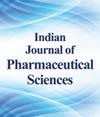In Vitro Anticancer and Antioxidant Potential of Pittosporum dasycaulon Leaves extract Against the Human Liver and Lymphoma Cancer
IF 0.4
4区 医学
Q4 PHARMACOLOGY & PHARMACY
Indian Journal of Pharmaceutical Sciences
Pub Date : 2023-01-01
DOI:10.36468/pharmaceutical-sciences.1076
引用次数: 0
Abstract
Cancers are the uncontrolled growth of cells or tumors, and it is one of the leading causes of death all over the world. Currently, available synthetic drugs such as cisplatin, doxorubicin and fluorouracil are reported to have notable side effects in living tissues (skin irritations, dry and cracked skin, and mouth sores). So researchers are scrutinizing for alternative medications to overcome these side effects. Plants are one of the vital sources of alternative medicines with less toxicity and may overcome these side-effects of synthetic drugs. The study evaluated cytotoxicity and antioxidant potential on methanolic and aqueous extract of Pittosporum dasycaulon leaves. In the present study of cytotoxicity, the selected extracts were screened against two cancer cell lines (human liver cancer cells and Lymph cancer cell-Dalton's lymphoma ascites ascites). Two normal cells, intestinal epithelial-6, and Rat spleen were used to test cytotoxicity by using the trypan blue exclusion method and 3-(4, 5-dimethylthiazolyl-2)-2, 5-diphenyltetrazolium bromide assay. The antiradical activity was also evaluated with its half maximal inhibitory concentration. The content of total phenolic, flavonoid and saponins was also estimated. The present study displayed leaves methanolic extract found to have a significant rate of cell death against cancer cell lines (Dalton's lymphoma ascites and human liver cancer cells) with lethal concentration 50 values ranging from 8.21±0.3 to 55.65±0.11 µg/ml. However, the same extract had very less cytotoxicity even in higher doses against non-cancerous intestinal cell lines (intestinal epithelial-6) and rat spleen cell lines ranging from 389.50±0.6 to 1800.00±0.1 μg/ml. The quantitative analysis of leaf methanolic extract showed a high level of saponins and phenolic compounds. Therefore, leaves of Pittosporum dasycaulon Miq are a promising candidate for natural antioxidant as well as anticancer components. Hence, further extensive study urges to evaluate the mechanism as well as to investigate of individual components responsible for cytotoxicity and antiradical potential.皮托孢子囊叶提取物对人肝癌和淋巴瘤的体外抗癌和抗氧化作用
癌症是细胞或肿瘤不受控制的生长,它是世界上导致死亡的主要原因之一。目前,据报道,现有的合成药物如顺铂、阿霉素和氟尿嘧啶对活体组织有明显的副作用(皮肤刺激、皮肤干燥和皲裂、口腔溃疡)。因此,研究人员正在仔细研究替代药物来克服这些副作用。植物是毒性较小的替代药物的重要来源之一,可以克服合成药物的这些副作用。本研究评价了油松叶醇提物和水提物的细胞毒性和抗氧化活性。在目前的细胞毒性研究中,所选提取物对两种癌细胞系(人肝癌细胞和淋巴癌细胞-道尔顿淋巴瘤腹水)进行了筛选。采用台番蓝排斥法和3-(4,5 -二甲基噻唑-2)- 2,5 -二苯基溴化四唑试验检测正常细胞肠上皮-6和大鼠脾脏的细胞毒性。并以其最大抑制浓度的一半来评价其抗自由基活性。测定了总酚、类黄酮和皂苷的含量。本研究发现,叶甲醇提取物对癌细胞(道尔顿淋巴瘤腹水细胞和人肝癌细胞)具有显著的细胞死亡率,致死浓度50值为8.21±0.3 ~ 55.65±0.11µg/ml。在389.50±0.6 ~ 1800.00±0.1 μg/ml范围内,相同的提取物对非癌性肠细胞株(肠上皮-6)和大鼠脾细胞株的细胞毒性很小。定量分析表明,叶甲醇提取物中皂苷和酚类化合物含量较高。因此,皮孢叶是一种很有前途的天然抗氧化剂和抗癌成分。因此,进一步的研究迫切需要评估其机制,并研究负责细胞毒性和抗自由基潜能的单个成分。
本文章由计算机程序翻译,如有差异,请以英文原文为准。
求助全文
约1分钟内获得全文
求助全文
来源期刊

Indian Journal of Pharmaceutical Sciences
PHARMACOLOGY & PHARMACY-
自引率
0.00%
发文量
0
审稿时长
2 months
期刊介绍:
The Indian Journal of Pharmaceutical Sciences (IJPS) is a bi-monthly Journal, which publishes original research work that contributes significantly to further the scientific knowledge in Pharmaceutical Sciences (Pharmaceutical Technology, Pharmaceutics, Biopharmaceutics, Pharmacokinetics, Pharmaceutical/Medicinal Chemistry, Computational Chemistry and Molecular Drug Design, Pharmacognosy and Phytochemistry, Pharmacology and Therapeutics, Pharmaceutical Analysis, Pharmacy Practice, Clinical and Hospital Pharmacy, Pharmacovigilance, Pharmacoepidemiology, Pharmacoeconomics, Drug Information, Patient Counselling, Adverse Drug Reactions Monitoring, Medication Errors, Medication Optimization, Medication Therapy Management, Cell Biology, Genomics and Proteomics, Pharmacogenomics, Bioinformatics and Biotechnology of Pharmaceutical Interest). The Journal publishes original research work either as a Full Research Paper or as a Short Communication. Review Articles on current topics in Pharmaceutical Sciences are also considered for publication by the Journal.
 求助内容:
求助内容: 应助结果提醒方式:
应助结果提醒方式:


